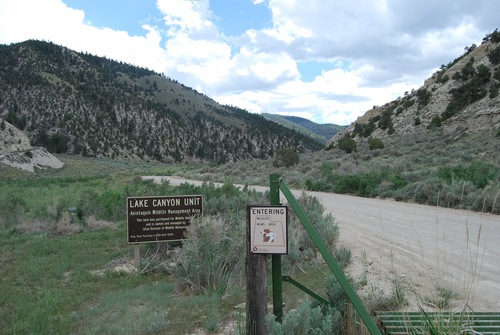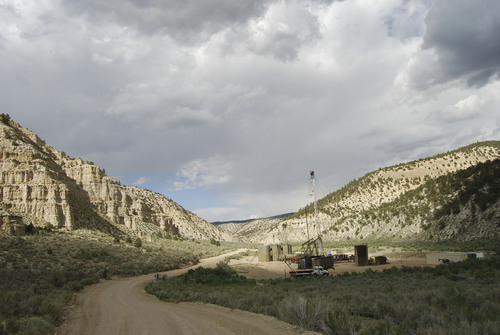This is an archived article that was published on sltrib.com in 2014, and information in the article may be outdated. It is provided only for personal research purposes and may not be reprinted.
The state of Utah owns nearly half a million acres it manages as safe havens for big game, birds and fish. But with some counties concerned about a dearth of privately held — and taxable — property, the Division of Wildlife Resources is selling pieces of wildlife management areas, including 1,070 acres in Duchesne County.
On June 25 the state will auction some of its holdings in Lake Canyon, a scenic canyon off the Strawberry River that the division acquired in 2001 to support brood populations of native cutthroat trout. The sale is part of a commitment the agency made to the county, which wants to guard against a net loss of private lands within its borders, according to Stephen Hansen, DWR's land and water asset manager.
"Private lands are the only ones where people pay property tax to pay for county services," Duchesne County planning director Mike Hyde said. "We are providing services on 2.1 million acres on a tax base of 580,000 acres of private land."
Federal and tribal lands abound in this county covering the western half of the Uinta Basin, framed by the Book Cliffs and the Uinta Mountains. Just 28 percent of the land is private, a portion on par with some rural Utah counties. Many others have even less.
The sale is not sitting well with Utah's angling community, which helped secure federal seed funding to meet the $3 million purchase price for the Lake Canyon acreage.
"It's disheartening the division is selling it without contacting anglers," said George Sommer, former chairman of the Blue Ribbon Fisheries Advisory Council. "The part that gets me about the policy [to return state-owned real estate to the private sector] is the public loses access to land."
Such policies can also infringe on private property rights since they might limit who can buy land from willing sellers.
But Duchesne officials say the county's private land base has been shrinking in recent decades as land has been gravitating into state-managed conservation areas, many of them set up to mitigate habitat loss arising from the Central Utah Project's river diversions.
Few counties host as much terrain in wildlife management areas than Duchesne, which currently has 93,350 acres so designated, according to Hyde. The state almost never owns the minerals under these holdings, so they usually remain open to oil and gas development.
Bill Barrett Corp. and Berry Petroleum have already sunk numerous wells along the bottom of Lake Canyon, and Berry is proposing to drill more wells to the west in the Avintaquin Canyon Wildlife Management Area, which includes Lake Canyon.
The state acquired its 4,800 acres in and around Lake Canyon from the Pinder family following the conviction of one of its members for a double homicide on its ranch there. The family insisted on selling the whole ranch, even though DWR wanted only the parts that included Lake Canyon Lake and connected drainages.
The agency has since removed all the fish from the half-mile lake and restocked it with pure-strain Colorado River cutthroat as part of a program to recover dwindling populations of this native trout. During spawning season, biologists harvest eggs and milt from the lake's fish and use it to produce cutthroat fry in hatcheries.
This month's auction features Lake Canyon parcels downstream from the lake. "We picked the property that would have the least negative effect," Hansen said.
Auction materials say the property has good recreational potential with cabin sites and lots of hunting and fishing opportunities nearby. They also note the parcel sits near four active wells. DWR is not disclosing a minimum bid, nor the appraised value of the land.
Also on the block June 25 are two state trust parcels and nearly 900 acres in Carbon County's Horse Canyon, land that had been donated to Utah State University.
DWR has already sold 950 acres in its Indian Creek Wildlife Management Area in a nod to Duchesne County's concerns. But county officials stressed they are not expecting the state to unload an acre for every acre it acquires for conservation.
"It's not something we are holding them hard and fast to," Hyde said. "We want to maintain the ability to develop private land. We are trying to strike a balance."





